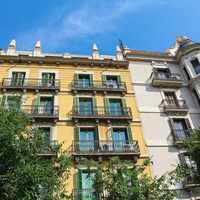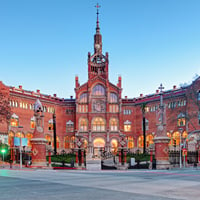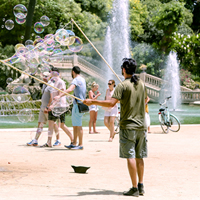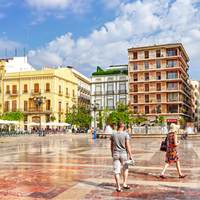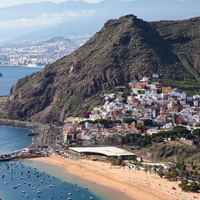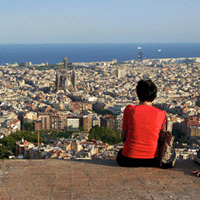Spain
Coastal BeachesSpain, officially known as the Kingdom of Spain, is a country largely located on the Iberian Peninsula in Europe, with territories across the globe including the Balearic Islands in the Mediterranean Sea, the Canary Islands in the Atlantic Ocean, and two enclaves in North Africa, Ceuta and Melilla. It is bordered by France, Andorra, and the Bay of Biscay to the northeast, the Atlantic Ocean to the north and northwest, Portugal to the west, and the Mediterranean Sea to the east and south. The country's mainland is characterized by a diverse landscape that includes the Pyrenees and the Sierra Nevada mountain ranges, vast plateaus like the Meseta Central, and several major rivers such as the Ebro, Duero, Tagus, and Guadalquivir. Spain's rich history is marked by Roman, Muslim, and Christian influences, which have shaped its culture, architecture, and traditions. The capital and largest city, Madrid, is known for its cultural and artistic heritage, featuring landmarks like the Royal Palace and the Prado Museum. Barcelona, the second-largest city, is famed for its modernist architecture, particularly the works of Antoni Gaudí, such as the Sagrada Família. Spanish cuisine, with its emphasis on fresh ingredients and regional diversity, is another integral part of the country's identity, featuring dishes like paella, tapas, and gazpacho. Spain is a parliamentary constitutional monarchy with a hereditary monarchy and a bicameral parliament, the Cortes Generales. It is a member of the European Union, the United Nations, the World Trade Organization, and many other international organizations. The country's economy is the fourth-largest in the Eurozone, driven by sectors such as tourism, manufacturing, agriculture, and energy. Spain is also known for its festivals, such as La Tomatina and the Running of the Bulls, and its contribution to the arts, with figures like Pablo Picasso and Salvador Dalí being globally recognized. The Spanish climate varies from temperate in the north to dry and hot in the south, which, along with its historic sites and vibrant cities, makes Spain a popular destination for tourists from around the world. The official language is Spanish, with other regional languages like Catalan, Galician, and Basque also recognized. Spain's influence on global culture, its scenic beauty, and its dynamic society make it a unique and fascinating country with a rich tapestry of experiences for both residents and visitors.
 Innoinsure
InnoinsureGet Quote
Hassle-free health insurance policies from the 2 leading health insurance companies in Spain: DKV and Asisa. Innoinsure provides health insurance for expats to obtain Spanish visas such as the non-lucrative, digital nomad, golden visa and student visa. Our insurance also meets the requirements for Spanish residency, TIE and NIE applications and renewals.
 Innoinsure
InnoinsureHassle-free health insurance policies from the 2 leading health insurance companies in Spain: DKV and Asisa. Innoinsure provides health insurance for expats to obtain Spanish visas such as the non-lucrative, digital nomad, golden visa and student visa. Our insurance also meets the requirements for Spanish residency, TIE and NIE applications and renewals.
Get Quote
Living in Spain
Best Places to Live in Spain
Visa & Residency
Obtaining a residency in Spain can be a straightforward process, but it requires careful preparation and attention to detail. The most common types of residency visas that expats apply for are the Non-Lucrative Visa and the Golden Visa. The Non-Lucrative Visa is ideal for individuals who can support themselves without working, such as retirees or remote workers. To apply for this visa, applicants must prove they have sufficient financial means to live in Spain without income from employment, provide proof of private health insurance, and have a clean criminal record. The visa is initially granted for one year and can be renewed for two-year periods, provided the requirements are still met. After five years of legal residency, applicants can apply for long-term residency or even Spanish citizenship. The Golden Visa, on the other hand, is aimed at investors. It requires a significant investment in Spain, such as purchasing real estate worth at least €500,000, investing €1 million in Spanish companies, or depositing €1 million in a Spanish bank. The Golden Visa offers a fast track to residency and is particularly popular among non-EU nationals. It grants residency for two years, which is renewable for five-year periods, and eventually leads to permanent residency and citizenship if desired. The application process for both visas involves submitting the necessary documentation to the Spanish consulate or embassy in the applicant's home country. After the initial approval, the applicant will receive a visa that allows them to enter Spain. Upon arrival, they must apply for a Foreigner Identity Card (TIE) at the local office or police station. The process can be complex and time-consuming, often requiring translations and apostilles for official documents. It is recommended to seek legal advice or assistance from immigration professionals to navigate the process successfully. Overall, while the process is manageable, it does require thorough preparation and understanding of the Spanish immigration system.
Healthcare in Spain
The healthcare system in Spain is known for being one of the best in the world, offering both public and private options. The public healthcare system, Sistema Nacional de Salud (SNS), provides universal coverage and is funded by taxes. It is accessible to all residents, including expats who are registered and contributing to the Spanish social security system. Private healthcare is also available and is often used by those seeking shorter wait times and more choice in specialists. The quality of healthcare in Spain is generally high, with well-trained medical staff and modern facilities. Public healthcare is free at the point of service, while private healthcare costs can vary widely depending on the services and insurance coverage. Expats and digital nomads can access public healthcare once they obtain a residence permit and register with the social security system. However, until they are registered, they should have private health insurance to cover any medical needs.
Cost of Living
The cost of living in Spain is considered moderate compared to other Western European countries. Essentials like food, public transport, and housing are reasonably priced, making it an attractive destination for expatriates and retirees.
Weather
Spain has a diverse climate with the majority being temperate. The north experiences a maritime climate with cool summers and mild winters. The central plateau has a continental climate with hot summers and cold winters. The Mediterranean coast enjoys mild winters and warm to hot summers.
Educational System in Spain
The educational system in Spain is well-structured and provides a range of options for families moving to the country. Education in Spain is compulsory from the ages of 6 to 16. The system is divided into several stages: Educación Infantil (Pre-school), Educación Primaria (Primary Education), Educación Secundaria Obligatoria (Compulsory Secondary Education), and Bachillerato (Post-Compulsory Secondary Education). Pre-school, which is not compulsory, caters to children from 3 to 6 years old and is divided into two cycles. Primary Education lasts for six years, typically for children from 6 to 12 years old, and is the first compulsory stage. It is followed by Compulsory Secondary Education, which lasts for four years, from ages 12 to 16. After completing this, students can choose to pursue Bachillerato for two years, which prepares them for university entrance, or they can opt for vocational training. The Spanish education system is known for its high-quality public schools, with private and international schools also available. Public education in Spain is free, although there may be costs for books and materials. The academic year runs from September to June, and the language of instruction is primarily Spanish, with options for regional languages such as Catalan, Galician, and Basque in their respective regions. Spain also offers a variety of international baccalaureate programs for students. Upon graduation, students receive a certificate that enables them to proceed to higher education or enter the workforce
Universities in Spain
The university system in Spain is diverse and offers a wide range of academic programs for both local and international students. Universities in Spain are either public or private, with the majority being public. The academic year typically starts in September or October and ends in June. Undergraduate degrees (Grado) usually take four years to complete, while master's degrees (Máster) take one or two years, and doctoral degrees (Doctorado) can take three or more years. The European Credit Transfer and Accumulation System (ECTS) is used, and students are required to complete a certain number of credits to graduate. Admission to Spanish universities generally requires passing an entrance exam known as the "Selectividad," although there are alternative access routes for foreign students, such as validation of their secondary education qualifications. Spanish universities are known for their strong programs in humanities, social sciences, engineering, and medicine. The country also has a number of prestigious business schools. The language of instruction is mainly Spanish, but there are increasing opportunities to study in English, especially at the postgraduate level. International students are encouraged to learn Spanish to enhance their experience and integration into the local culture. Support services are often available to help foreign students adjust to life in Spain
Copyright 1997-2025 Burlingame Interactive, Inc.


